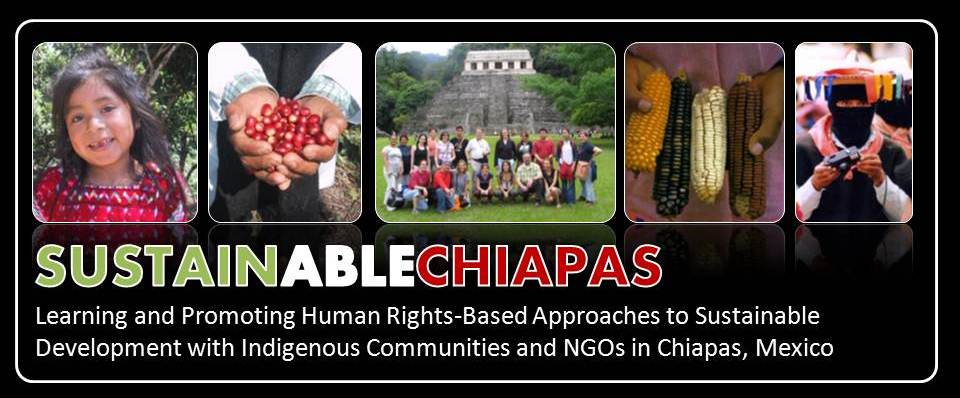Coffee is the main source of income for most indigenous peasant people in Chiapas. Yet, the fluctuation of the market price, along with unequal distribution of resources and organizational capacity among indigenous people, coffee production is insufficient to sustain families in their basic educational and health needs. Fair trade certifications and organic production of numerous cooperatives have helped to avoid the exploitation "coyotes" (mediators). Yet, the better prices are still far from being really "fair" or just. The costs and commitment required in the certifications are often too much of a burden from individual farmers. Yet, only organized collectivities (cooperatives or associations) can provide viable alternative to plain exploitation of poor indigenous families.
Fair trade certifications or other alternative models of economic trade are important and to be promoted. But are often limited by poor distribution, lack of awareness of consumer and difficulties to apply the very same value practices to artisan productions of Maya weaving and embroidery (see Maya Works as an attempt).
The following video illustrate the values of fair trade coffee in its production and in connection to the struggle of Las Abejas of Chiapas. Grounds for Action is a video director by Dr. Marco Tavanti on the Maya Vinic Fair trade and organic coffee cooperative from the indigenous Maya people of the civil society organization Las Abejas (the bees), in Chiapas, Mexico. The video (TRT 17 min) shows how the cooperative emerged as a positive and peaceful response after the Acteal massacre of December 22, 1997.
In 1999 Las Abejas decided to form a cooperative of coffee producers. The cooperative addressed two important problems individual producers faced with the coyotes: illiteracy and storage problems. The coyotes manipulated the weight and payment of coffee to individual producers and profited from the lack of storage capacity. The cooperative soon became a visible sign of hope, not only for Las Abejas but for numerous other indigenous coffee producers who needed the benefits and organization of civil society. Pre-existing coffee cooperatives like Majomut or Mut Vitz were controlled by members of the PRI party or Zapatistas. The Highlands of Chiapas needed a cooperative that would welcome representatives of civil society organizations. However, Maya Vinic does not consider itself a “politically neutral” organization. Their members and leaders believe that the Chiapas struggle for economic sustainability and cultural resistance passes through to the operation of a coffee cooperative. And yet, they are inclusive in their membership and maintain a dialogue with coffee cooperatives and producers outside of Chiapas.
On December 11, 2001, Las Abejas received the prestigious Human Rights Award of the French Republic. The recognition, presented by French Prime Minister Lionel Jospin to Las Abejas’ representatives in Paris, was directed to the organization for their work in defense of the cultural identity of the indigenous people of Mexico. They recognized Las Abejas’ women for their courageous works of resistance for the construction of peace with justice and dignity. But most of all, Las Abejas received this award for their courage to create Maya Vinic in the aftermath of the Acteal massacre. In a climate of violence, tension and grief for the massacre of 45 innocent indigenous women, children and men murdered by Mexican paramilitary groups in December 1997, Las Abejas did not respond to violence with violence. They did not choose to adopt a resistance strategy of isolation. Instead they built on the international networks acquired after the massacre and began expanding their networks for selling coffee and becoming more sustainable. There is speculation that the Acteal massacre was planned in December to interfere with the coffee harvest. Many paramilitaries and PRI supporters benefited both economically and politically, at the cost of the Abejas members who were too terrified to go out and harvest their coffee that year. The creation of the Maya Vinic cooperative was an attempt to channel their products toward alternative markets such as those of fair trade and organic products.
Fair prices are a fundamental principle in the Fair trade alternative. Yet, the other six principles monitored and promoted by the German-based Fair-trade Labeling Organization International (FLO) guarantee that cooperatives work toward economic and social sustainability. According to the Maya Vinic president, the cooperative gives people the opportunity to maintain their cultural identity by doing what they have always done and to make a living by doing it. The cooperative clearly benefits economic sustainability for indigenous communities and Chiapas CSOs that would not have the means necessary to survive.
Members of Maya Vinic know that the real struggle in Chiapas is more than ever an economic struggle linked to their rights to cultivate their lands and sell their products at a fair price. However, a fair trade-certified coffee is not a guarantee that their coffee will sell. Maya Vinic accelerated its process of certification thanks to the already existing network with fair trade importers and roasters from Europe and the United States.
For more information about the co-op, visit the Maya Vinic web site (Spanish only) at http://www.mayavinic.com/
To buy Certified Organic and Fair Trade coffee from Maya Vinic contact their preferred US importer Higher Grounds Trading Company at http://www.highergroundstrading.com
The video was produced by volunteer video professionals and produced by Jubilee Economics Ministries (JEM).
Posted by Dr. Marco Tavanti
Text based on the article Tavanti, Marco. “Chiapas Civil Society Organizations: Cultural Resistance and Economic Alternatives through Fair Trade Cooperatives and International Networks.” Sociedad Civil y Desarrollo Local, Primera Edición 2007, 445-460.




